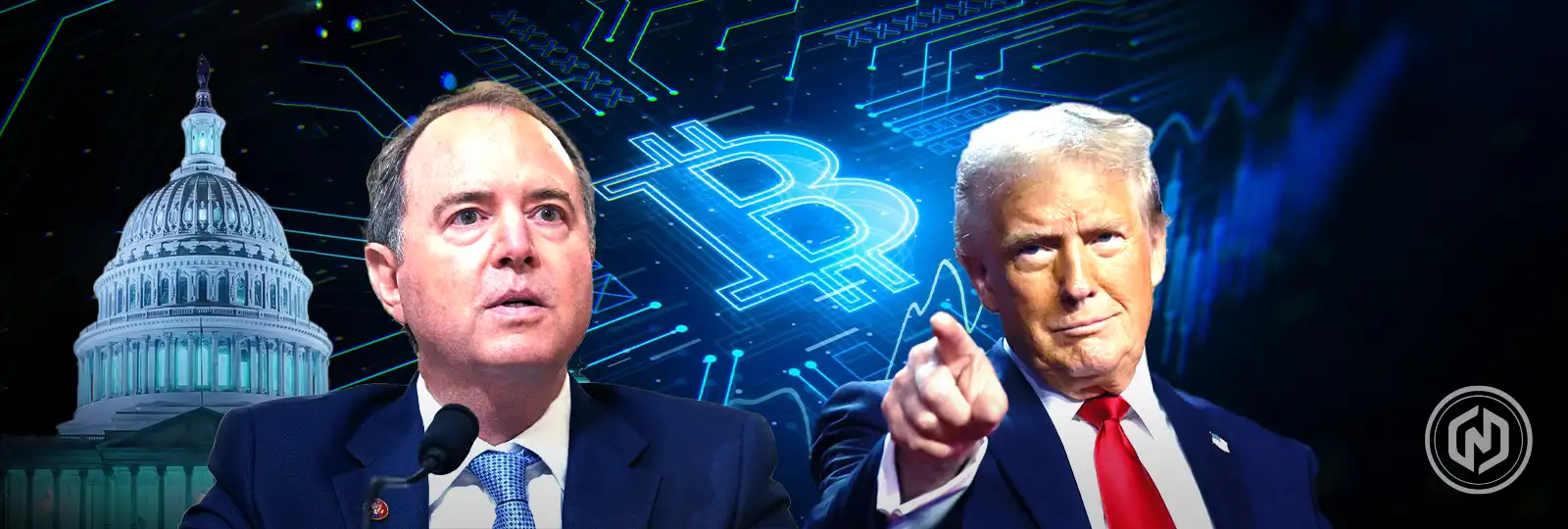US Senator Adam Schiff (D-CA) introduced a new bill aimed at curbing potential conflicts of interest between public service and the crypto industry. The legislation, titled the Curbing Officials’ Income and Nondisclosure (COIN) Act, would prohibit the president, vice president, and their immediate family members from launching or promoting cryptocurrency ventures while in office.
The move follows growing concern over the increasing overlap between political power and digital assets, especially in light of President Donald Trump’s expanding presence in the crypto space.
Schiff’s COIN Act Seeks Crypto Ban for US Presidents
The COIN Act proposes a complete ban on sitting presidents, vice presidents, and their families from issuing, endorsing, or profiting from any form of cryptocurrency, including meme coins, NFTs, and stablecoins. The act also proposes mandatory disclosure of digital asset sales exceeding $1,000. The proposal also directs civil penalties equal to profits gained from violations, alongside potential prison time of up to five years.
Senator Schiff tied the bill directly to Trump’s crypto dealings, stating, “President Donald Trump’s cryptocurrency activities raise serious ethical, legal, and constitutional red flags, particularly in how he may be using public office for private gain.”
The timing of Schiff’s proposal has drawn scrutiny. Just a week earlier, he voted in favor of the GENIUS Act, which outlines a regulatory framework for stablecoins but notably omits restrictions on presidential crypto activity.
Initially, Democrats opposed the bill due to this loophole. But, facing political pressure to move the legislation forward, 18 Democrats (including Schiff), ultimately supported it.
Notably, the GENIUS Act exempts both the President and VP from the same limitations it imposes on other public officials.
Schiff’s COIN Act is not the only Democratic initiative aimed at Trump’s crypto ties. Other bills, such as the MEME Act and the Stop TRUMP in Crypto Act, also seek to address conflicts of interest but are unlikely to pass in a Republican-controlled Congress.
Still, nine Senate Democrats have signed on as co-sponsors of the COIN Act, with seven of them also having supported the GENIUS Act—reflecting an effort to close regulatory gaps left by the earlier legislation.
President Trump remains deeply involved in the crypto market. According to newly released financial disclosures, he earned $58 million in 2024 from crypto-related activities, including sales of WLFI tokens.
Among those crypto projections is a planned $390 million token offering and continued profits from a meme coin launched earlier this year. Trump’s portfolio reportedly also includes interests in Bitcoin mining, tokenized securities, and digital asset ETFs.
Critics argue some of Trump’s businesses have benefited from favorable regulatory decisions made during his administration. Most recently, the SEC approved a registration statement for Trump Media and Technology Group (TMTG), linked to a $2.3 billion Bitcoin treasury plan involving 85 million shares.
Warren Raises Ethical Concerns Broaden Beyond Trump
In March, Senator Elizabeth Warren called for investigations into possible ethical violations involving David Sacks, AI and crypto Czar, in relation to crypto policies. Moreover, she even called on the US Office of Government Ethics and financial regulatory agencies to investigate the ethical and regulatory implications of the $TRUMP token and $MELANIA, saying that the memecoins bear conflict of interest risks to the President.
Also Read: Trump Backs Crypto, Denies Profiting From Digital Assets


